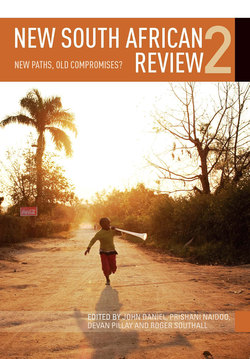Читать книгу New South African Review 2 - Paul Hoffman - Страница 30
На сайте Литреса книга снята с продажи.
THE SQUANDERED PRESIDENCY
ОглавлениеThe image of Mbeki the pragmatist and stable technocrat faded as his first term progressed and as he staked out eccentric, even bizarre, positions on particular issues and perhaps sought to overcompensate for the broadly conformist nature of his government’s economic policies by a more contrived and laboured militancy in other contexts. His policy of ‘quiet diplomacy’, introduced following Zimbabwe’s descent into state-orchestrated mayhem in 2000, had exhausted its (always) limited potential to stabilise that country and to facilitate democratic change by the time of the fraudulent presidential election of 2002. Persistence with the policy subsequent to that date, in the face of extreme regime violence and an openly stated determination to liquidate the opposition, was an exercise in self-deception on Mbeki’s part and a failure comparable in scale to his simultaneous abdication of responsibility in dealing with South Africa’s HIV/AIDS pandemic.
Indeed one wonders: was Nelson Mandela’s lament (2008) about a ‘tragic failure of leadership’ directed at least as much towards Mbeki as it was towards the regime in Harare? People inevitably drew the conclusion that if South Africa failed to condemn unbridled state terrorism in its own neighbourhood and could display such scant regard for the flouting of democratic values – and if its own government ministers could offer supportive words to a regime such as Mugabe’s – then a replay of the Zimbabwean scenario was a possibility in South Africa. In 2003, the then foreign minister, Nkosazana Dlamini-Zuma (2003), declared that an ANC government would never condemn Zimbabwe, a position which could only have emboldened the Harare regime. In the same year (2003), Membathisi Mdladlana, then labour minister, stated that South Africa had much to learn from the Zimbabwean ‘land reform’ process. In a similar vein, the ANC Youth League leader, Julius Malema, praised Mugabe’s land seizures in Zimbabwe as a model for South Africa to emulate while denouncing the ‘Mickey Mouse’ MDC (Bridgland, 2010). In June 2009, South Africa’s minister of Land Reform and Rural Development, Gugile Nkwinti, announced that the ANC government would scrap its ‘willing-buyer, willing-seller’ land redistribution policy, which allows the government to acquire land only at a market prices and only with the consent of the land owner, and replace it with ‘less costly, alternative methods of land acquisition’. Whether a break with the ‘willing-buyer, willing-seller’ principle is an attempt to accelerate land redistribution and thus neutralise Zimbabwean-style populist demagoguery, or whether it is an early symptom of it, remains moot at this stage.
Added to this was a South African rhetoric which tended to focus not on the perpetrators of human rights abuses and the theft of elections but rather on the easier option of blaming the West or Western racism and which even echoed Mugabe’s own vitriol in characterising the opposition MDC – the electoral victors – as Western puppets seeking to reintroduce colonial rule. In a letter to Tsvangirai on 22 November 2008, Mbeki wrote that: ‘It may be that, for whatever reason, you consider our region and continent as being of little consequence to the future of Zimbabwe, believing that others further away, in western Europe and North America, are of greater importance’. Such strident criticism was never directed at Mugabe.
There have, over the years, been numerous indications that South Africa has lost its way on the Zimbabwe question and has departed from the values underpinning its own transition to democracy and which informed Mbeki’s ‘African renaissance’ vision and his role in constructing the Nepad. Although ‘quiet diplomacy’ was premised on the belief that a more punitive approach would cause economic collapse in Zimbabwe, thus triggering a mass influx of refugees, this has paradoxically proved to be the outcome of South Africa’s more indulgent policy. At least three million Zimbabweans have now taken refuge abroad, the vast bulk of them in South Africa, and through the first decade of the twenty-first century Zimbabwe had the dubious distinction of recording the highest inflation rate in history and becoming the world’s fastest contracting economy.
Instead of intervening to pressurise Zimbabwe, South Africa has rejected any use of its considerable economic leverage against the Mugabe regime and has opposed the imposition of ‘smart’ sanctions imposed on Zanu’s leadership. In 2008, it also used its position as a non-permanent member of the United Nations Security Council to mobilise opinion against any extension of sanctions on Zimbabwe (and indeed any measures against the Burmese junta and the Al-Bashir regime in Sudan), making common cause in the process with China and Russia as guardians of state sovereignty and non-interference in a state’s internal affairs. In making this assessment, we do recognise that South Africa finds itself in a quandary in the region; its history of aggressive destabilisation during the apartheid era is an unfortunate backdrop to contemporary debates and its greater economic and military weight vis-à-vis its neighbours generates predictable concerns about South African hegemony. Those realities necessitate a pragmatism and sensitivity in South Africa’s regional behaviour, but ‘quiet diplomacy’ is rooted in a culture of over compensation for the past, one which is inhibiting South Africa from playing a more dynamic role as the shaper of a new regional consensus built around democratic values. Instead, as the Zimbabwe case has graphically demonstrated, African peoples continue to be sacrificed on the altar of an African-regime solidarity which is being forged within the supposedly progressive framework of ‘multilateralism’.
